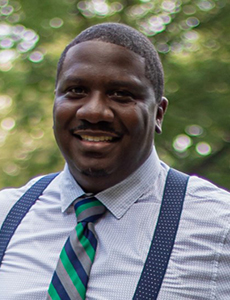Is the CPCU the Instruction Manual of Insurance? Here’s What Designees Say

Editor’s Note: Risk & Insurance is an affiliate of The Institutes, which offers the CPCU
The COVID-19 pandemic has made it abundantly clear that risks are ever changing. In addition to assessing the risks of the pandemic, insurance professionals have to think about the ways in which it could affect their individual lives.
Added to that, is the fact that new technologies, increasing globalization and global climate change have created an already complex risk landscape for insurers to navigate.
With such an ever-changing world, insurance and risk management professionals may need to hit the books just to keep up.
Insurance designations provide a way for those working in the industry to hone and practice their skills, learn about new risks and make professional connections.
“It doesn’t matter what it is that you’re trying to accomplish, whether it’s running a marathon or learning to play an instrument or anything in business, you have to seek out ways to practice. That’s how we improve,” said John Chino, ARM-PE, CSRM, area senior vice president, public sector at Arthur J. Gallagher.
“I know of no better way to practice then to pursue and achieve a designation.”
When it comes to insurance designations, few loom larger than the Chartered Property Casualty Underwriter (CPCU).
bCPCU holders say that it has provided them with skills they use daily, connections in the industry and a path to promotions and future success.
“The CPCU not only gives you a breadth of industry knowledge, it can also expose you to other career paths,” said Patrick Shelton, CPCU, AU-M, underwriter for NIF Group, a JenCap Holdings Company.
“Knowledge is power, and designations are essential to providing the knowledge you need to excel.”
What Is the CPCU?
The CPCU is made up of nine total courses, including four core foundational courses in emerging risks, insurance operations, insurance law and corporate finance and accounting.
The core courses have recently been updated so that the designation can now be completed entirely online.
The designation also offers concentrations in commercial and personal lines and electives so that insurance professionals can further tailor their coursework to their particular niche within the industry.
“I can’t remember half of what I learned in college, but I use my CPCU skills daily,” said Melissa Burns, CPCU, ARe, reinsurance analyst at FM Global.
Once finished with their coursework, designation holders can attend the CPCU Society’s Annual Meeting and join a local chapter to continue making connections with other professionals in the industry.
“The CPCU touches on nearly every property/casualty subject out there. I work for a commercial property insurer, but learning about casualty, homeowners, auto, etc. gave me a well-rounded edge and a lot of confidence,” Burns said.
What’s the CPCU Time Frame?
On average, the designation takes two to three years to complete. CPCU holders say that it’s an excellent designation to pursue at any career stage.

John Chino, area senior vice president, public sector, Gallagher
For young insurance professionals, the CPCU and other designations can provide a framework for understanding the industry better. Chino likened working in insurance without a designation to trying to build a Lego version of Hogwarts without the instructions.
“The designation is the instructions,” he said.
“This business is highly complex, it’s dynamic, at times it’s overwhelming and if you don’t have the framework, the framework is precisely what those designations teach you, well then it’s very challenging to be effective.”
Young professionals in the first three to seven years of their career should also consider pursuing the CPCU and other designations as a way to stand out to management and launch their careers in the industry.
“Having a CPCU could possibly catapult your career and position within a company as the designation is widely recognized among one of the top in the insurance and risk management world,” said Terrance E. Harvey, CPCU, medical malpractice underwriter for MMIP.
Older professionals can also benefit from the ways a CPCU helps them stand out in their career.
“With millennials flooding the marketplace as of recent, having a professional designation on a resume will keep older professionals in the workforce as their experience and expertise will be very much needed,” Harvey said.
“It also shows a commitment to learning as opposed to fighting possibly dated strategies.”
What Can the CPCU Do for Your Career?
Insurance professionals say the strong foundation of knowledge the CPCU gave them has allowed them to advance in their careers and take on projects that they wouldn’t have been considered for without the designation.
“Since getting my CPCU, I’ve been asked to lead projects I wouldn’t have been considered for otherwise. It’s important to have a strong foundation so you can understand and adapt in this fast-moving industry,” Burns said.
“Even though the CPCU and other designations are not guaranteed to advance your career, they certainly influence the way you are seen as a professional.”
“The rigorousness of earning a CPCU designation is known to all; it’s not for the faint of heart. Especially when it comes to the finance and accounting section,” Shelton added.
“Since it is such a difficult designation to earn, it really demonstrates not only a professional’s dedication to continuing education but to the insurance industry as well.”
Earning a CPCU or other designation can also help professionals transition to a career in insurance after working in other industries.
“Designations provide insurance professionals with a crash course in the risk and insurance mechanism, which, in my opinion, will accelerate their future growth, since they have that solid foundation of knowledge that designations provide,” Shelton said.
An IRMI report from 2019 noted that only 49 colleges and universities in the U.S. have risk management and insurance programs, which means many insurance professionals come to the industry from other fields or career paths.
A professional designation can serve as a means to help make that transition smoother.
So Why Get the CPCU?
After majoring in forensic science in college, Burns said she earned her CPCU, because she felt she needed it to further her career in the industry.
“While everyone thought [my degree] was cool, and I could always find out who stole my lunch from the break room fridge, it wasn’t the kind of background that qualified me to become an underwriter,” Burns said.
“I debated getting an ARM or CPCU, [and] ultimately, the CPCU won out because it was the pinnacle of designations — like a Master’s in Insurance.”
Pursuing a CPCU can also help insurance professionals stay up-to-date on the modern risk landscape.

Terrance E. Harvey, CPCU, medical malpractice underwriter, MMIP
With all of the emerging risks brought on by COVID-19, increasing one’s risk management and insurance education could be an exceptionally important career move than ever before.
“In this time of uncertainty, and as the insurance industry is changing rapidly before our eyes, I feel everyone in the insurance and risk management field should pursue a professional designation,” Harvey said.
“Having a designation keeps you ahead of the pack, and the continuing education will keep you current and up-to-date with topics pertaining to emerging risks.”
Even if the CPCU isn’t right for you, Chino said that other designations can still add a lot of value: “There is no such thing as a bad designation, there is no designation that, when embarked upon, would not be worth your time, there is simply no such a thing,” he said. &










